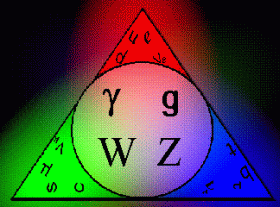theoretical physics group

|
About
The research interests and activities of the theoretical physics group centre on algebraic structures and their applications in physics and, more recently, biology. These range from the representation theory of Lie groups and Lie algebras, the combinatorics of quantum field theory, symmetry and supersymmetry in Hamiltonian lattice gauge theory and conformal supersymmetry; fundamental studies of quantum systems such as entanglement, the quantum-classical boundary, elementary particle classification and alternative theories; through to specific case studies such as models for asymmetric top molecules, or Yang-Mills symmetry reductions There is also work on more novel topics such as superalgebras, Hopf algebras, braid groups, and formal deformations of such objects. A parallel stream of research is in mathematical biology, where applications of group representations and invariant theory to molecular phylogenetics have been developed.
Current active projects include:
- Phylogenetic invariants and Markov invariants (Sumner, Jarvis, Holland, Woodhams).
- Quantum/classical boundary (Jacobsen and Jarvis).
- Hamiltonian lattice gauge theory, (Rudolph, Yates and Jarvis).
- Quadratic superalgebras/conformal supersymmetry (Rudolph and Jarvis, Meljanac and Jarvis).
- Born reciprocity/reciprocal relativity (Low, Jarvis and Campoamor-Stursberg).
- Hopf algebras, group character rings (Jarvis, Fauser, King).
- Partition monoid (Fitzgerald, Jarvis and Hamm).
- Quantum simulation of stochastic models, QRW (Jarvis and Ellinas).
- Yang-Mills-Dirac symmetry reductions (Jarvis and Inglis).
- Grassmann variables and unified model building (Delbourgo, Jarvis and Stack).
Meetings
Phylomania 2012, the UTas theoretical phylogenetics meeting, Nov 8-9, 2012.Phylomania 2011, the UTas theoretical phylogenetics meeting, Nov 10-11, 2011.
Phylomania 2010, the UTas theoretical phylogenetics meeting, Nov 4-5, 2010.
Phylomania 2009, Oct 29-30, 2009.
Members
Recent Members
- Stuart Morgan
- Sol Jacobsen
- Luke Yates
- Graham Legg
- Isamu Imahori
- Gavin Barwick
Collaborators
Visitors
Jesus Fernandez-Sanchez, Mar-Jul 2010.
Elizabeth Allman and John Rhodes, Nov-Dec 2010.<\li>
For prospective students.
Modern mathematical physics draws its methods eclectically from a pantheon of upmarket higher mathematics;
quantum field theory itself requires a long lead time to digest and so often fourth year projects do not grapple with these topics `head on'.
Rather there are many challenging and applicable problems in (relativistic) quantum mechanics and general relativity which are accessible and feasible for a
fourth year honours thesis.
To support these topics, lecture units on gravitation and cosmology and quantum computation and quantum information are available.
There are also several project topics in the mathematical biology stream that would be suitable for an honours thesis.
At MSc and PhD level, research projects are typically available in one of the current fields of interest.
The theory group has a well-established international reputation and can offer supervision of interesting research programs in these subjects
and in related areas of mathematical physics.
Typically, students become conversant with the required groundwork in their first few months by informal study and by attending occasional
lecture series offered by members of the group, before focussing fully on their own topic.
If you are interested in post-graduate study within the theoretical physics group, feel free to contact anyone in the group to discuss possibilities
and Peter Jarvis for formal arrangements.
Last modified Jun2010 by Jeremy Sumner.

